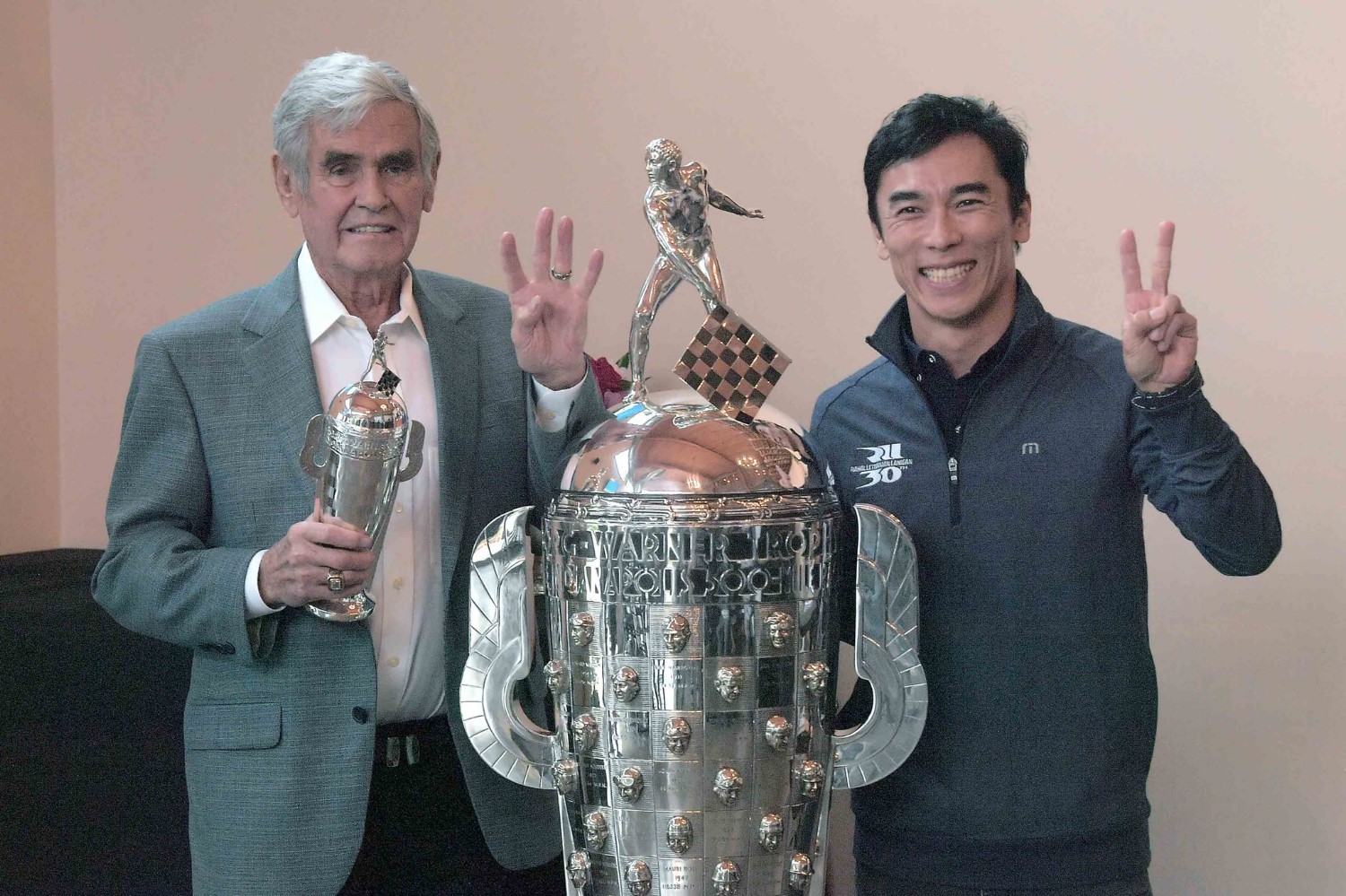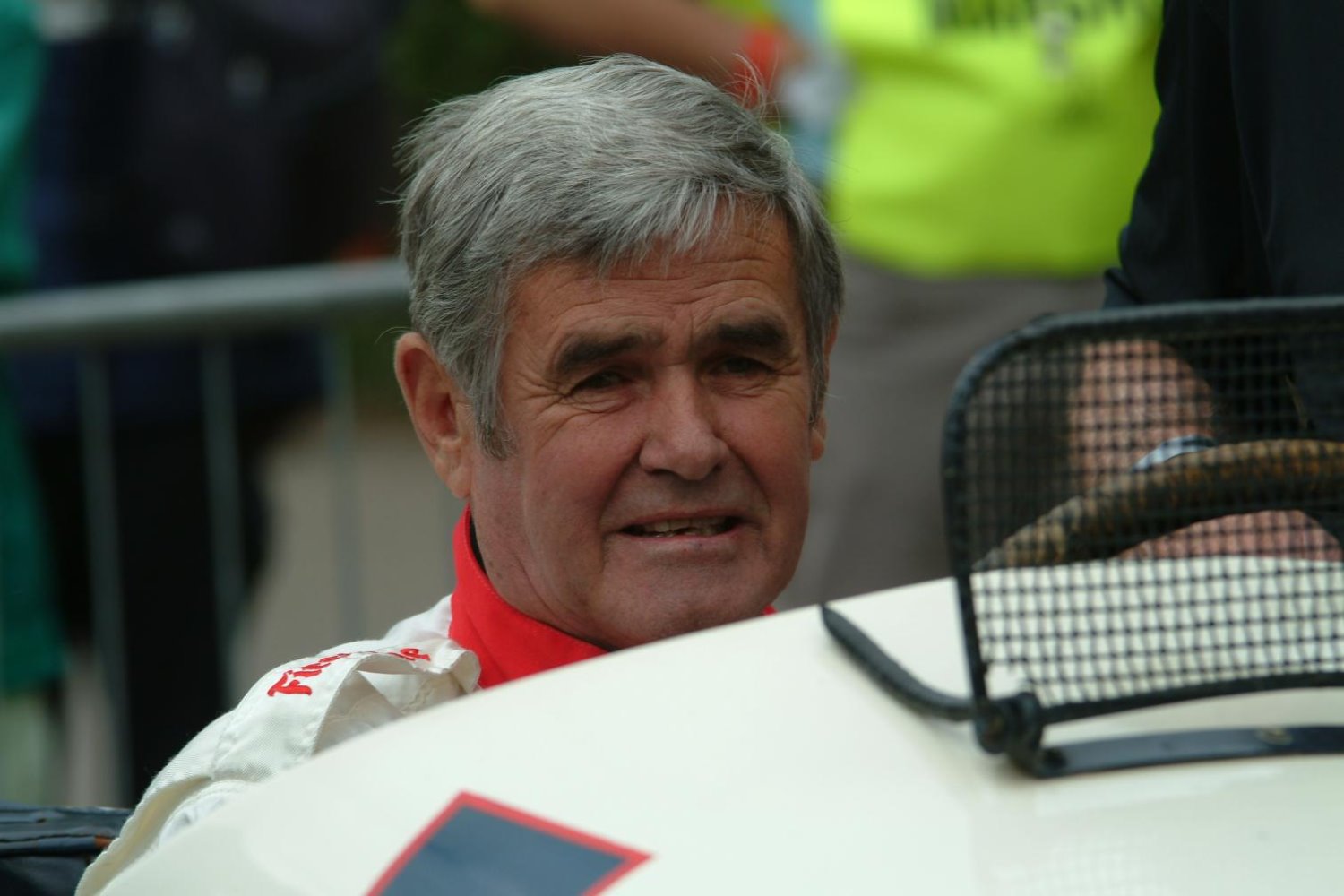IndyCar: 4-Time Indy 500 winner Al Unser dead at 82 (2nd Update)
Statements from Roger Penske, J. Douglas Boles
Statements from Roger Penske and J. Douglas Boles about the passing of four-time Indianapolis 500 winner Al Unser, who died Dec. 9 at age 82:
“We have lost a true racing legend and a champion on and off the track. Al was the quiet leader of the Unser family, a tremendous competitor and one of the greatest drivers to ever race at the Indianapolis Motor Speedway. From carrying on his family’s winning tradition at Pikes Peak to racing in NASCAR, sports cars, earning championships in INDYCAR and IROC and, of course, becoming just the second driver to win the Indianapolis 500 four times, Al had an amazing career that spanned nearly 30 years. He produced two championships and three wins for our race team, including his memorable victory in the 1987 Indy 500 when he famously qualified and won with a car that was on display in a hotel lobby just a few days before. We were honored to help Al earn a place in history with his fourth Indy victory that day, and he will always be a big part of our Team. Our thoughts are with the Unser family as they mourn the loss of a man that was beloved across the racing world and beyond.” – Roger Penske
***
“In the 112 years of racing at the Indianapolis Motor Speedway, Al Unser’s career stands out among the others. His four Indianapolis 500 wins and most laps led in the ‘500’ (644) solidify him as one of the greatest of all time. Al achieved his successes competing against many of the best our sport has ever seen, which makes his accomplishments even more impressive. In addition, his quiet and humble approach outside of the car, combined with his fierce competitive spirit and fearless talent behind the wheel, made Al a fan favorite. He will be remembered as one of the best to ever race at Indianapolis, and we will all miss his smile, sense of humor and his warm, approachable personality. Our thoughts and prayers are with Susan Unser, the entire Unser family and all Al’s friends and fans.” – J. Douglas Boles, President, Indianapolis Motor Speedway
December 10, 2021
IMS Tribute
Alfred “Al” Unser, the second member of the Unser auto racing dynasty to win the Indianapolis 500 and the second INDYCAR SERIES driver in history to win four times at Indianapolis Motor Speedway, died Dec. 9 at his home in Chama, New Mexico, after a 17-year battle with cancer. He was 82.
Born in Albuquerque, New Mexico, on May 29, 1939, Unser followed his three older brothers and the generation of Unser brothers before them into auto racing. He was known as a quiet sponge, absorbing the lessons learned by his family members.
Initially, the Unsers were known for their prowess of the famed Pikes Peak Hill Climb, with Unser’s uncle, Louis Jr., the first to race up the Colorado mountain in 1926. Louis went on to win the sprint to the top a record nine times, and the family’s win total stands at 25, including two wins by Al Unser (1964-65).
The first generation of racing Unsers had been pointed toward competing at Indianapolis, but the pursuit was abandoned when Joe, the middle of three brothers, died testing a car in Colorado in 1929. Twenty-nine years later, in 1958, Unser’s oldest brother, Jerry Jr., finally got the family to the “500.”
Third son Bobby earned his first chance at Indy in 1963, with Al following him in 1965 as part of the decorated rookie class that included fellow future winners Mario Andretti and Gordon Johncock, plus Formula One veteran Masten Gregory and motorcycle ace Joe Leonard, who won Indy’s pole in 1968.
Unser won his first “500” in 1970, two years after Bobby won his first. Unser then became the fourth driver to repeat as Indy’s champion, something no other member of his family achieved.
Unser added Indy victories in 1978 and 1987 to join A.J. Foyt as a four-time winner. Rick Mears became the third member of the exclusive club with his 1991 victory. Helio Castroneves became the fourth in 2021.
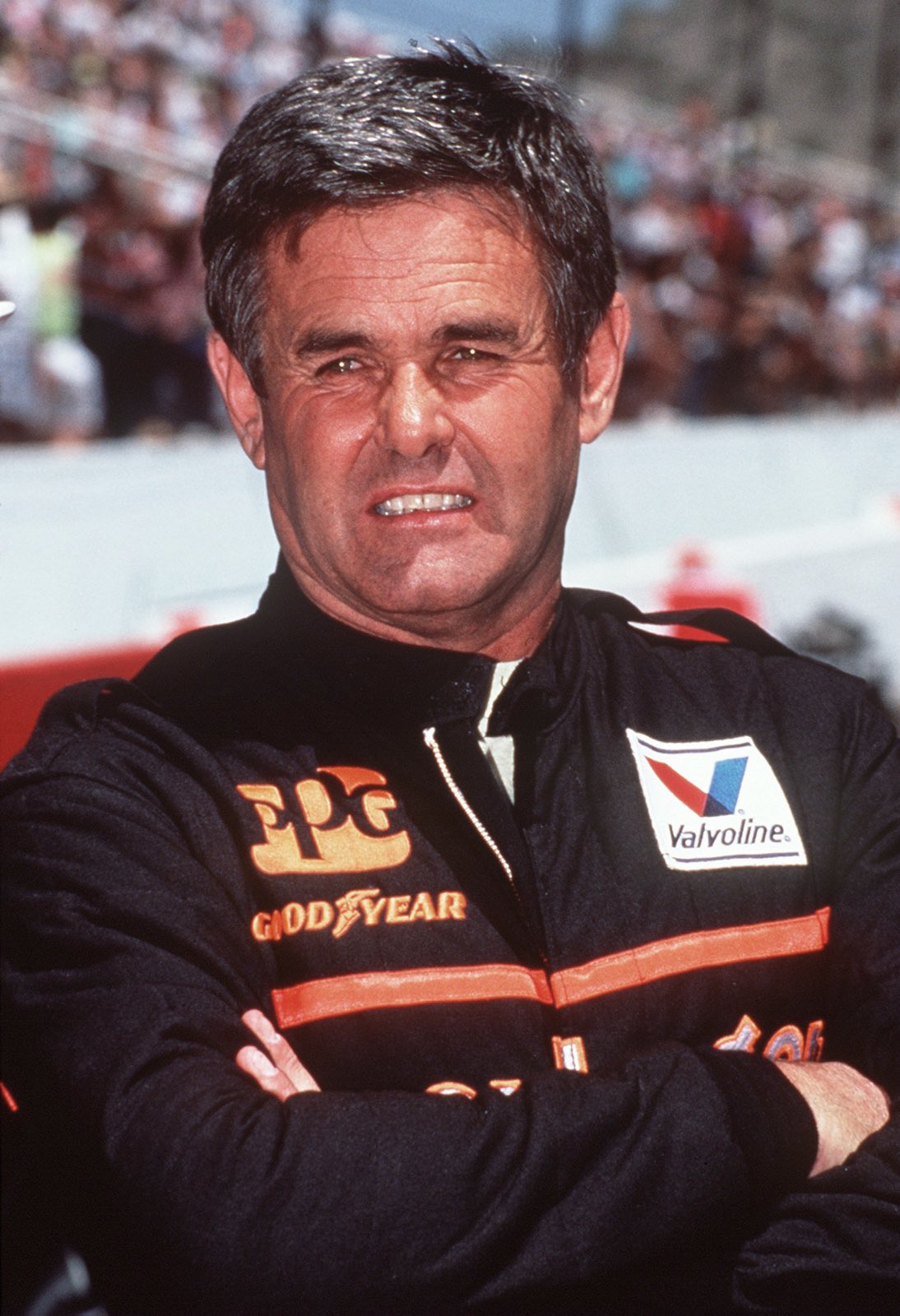
In 1992, Unser finished third in the “500,” but that’s not what defined the day. The race winner was his son, 30-year-old Al Unser Jr., making Unser the only driver in history to have a sibling and a son win Indy. Unser Jr. won his second “500” in 1994, pushing the family’s total to nine IMS victories. No other family has won more than four.
Combined, the Unsers have made 73 career starts in the “500,” a figure eclipsed only by the 76 of the Andrettis. The Unser participation: Al (27 races), Bobby (19), Al Jr. (19), Johnny (five), Robby (two) and Jerry (one).
While Unser was known for his driving patience, he also holds the record for the most laps led in the “500.” Leading the final lap of the 1987 race allowed him to tie Ralph DePalma’s 75-year-old record (612). Unser led 31 more laps over his final five IMS starts to push the all-time mark to 644.
Unser made 27 starts in the race, third-most in history behind only Foyt (35) and Andretti (29), and his final victory allowed him to break brother Bobby’s mark as the oldest race winner – 47 years, 350 days.
Unser won three INDYCAR SERIES season championships – in 1970, 1983 and 1985 – and eight 500-mile races. In 1978, he won the INDYCAR SERIES “Triple Crown” of 500-mile races (Indianapolis, Pocono and Ontario), a feat that remains unmatched.
Unser’s career begin in 1957 by racing modified roadsters, midgets and sprint cars. He made his championship dirt car debut in 1964 at Milwaukee driving for J.C. Agajanian, but that was his only start that season, and it lasted only 51 laps before the engine failed.
Coincidently, it had been at Foyt’s urging that car owners began to consider Unser for the sport’s better rides. Foyt had seen how smooth Unser had driven on the nation’s dirt tracks, and he praised Unser’s quiet, easygoing and disciplined style.
“He was a very smart race car driver,” Foyt said.
Unser’s first full INDYCAR season was in 1967, when he finished second to Foyt in the “500,” and the next year started a dominant period in the sport’s history. After winning five races for car owner Al Retzloff, Unser joined Vel’s Parnell Racing for the 1969 season, where he won five additional races with ace mechanic George Bignotti at the controls. The pairing might have won more often if not for Unser breaking his leg at IMS ahead of that year’s race.
In 1970, Unser added 10 more victories, including five in a row and eight of nine in a single stretch. Over a two-season stretch he won 11 of 13 and 13 of 16 races — 25 wins over four years.
Unser’s first “500” victory came in the No. 2 Johnny Lightning Special, a Colt/Ford that led 190 of the 200 laps from the pole. The margin of victory over Penske Racing’s Mark Donohue was 32.19 seconds.
“Al was the class of the field,” Johnny Rutherford said.
Unser’s second Indy win was with a similar car, but its path to victory was not as smooth. Unser started in the fifth position and only led 103 laps, including the final 83. McLaren’s Peter Revson finished second, 22.48 seconds behind the winner.
Unser nearly became the first and only “500” driver to three-peat. He finished second to Donohue in 1972.
In 1978, Unser drove for the Chaparral team in what was considered a second-tier ride. Yet, he was competitive throughout the race, dueling with Danny Ongais until Ongais retired with engine failure to hand Unser a commanding 35-second lead. Unser might have finished with that margin but, in a rare miscue, he struck a tire on his final pit stop. Tom Sneva tried to capitalize, but he came up eight seconds short.
Unser and Sneva were locked in a much closer battle in the 1983 “500,” and this one included Al Jr. in his first IMS race. Unser had his son protecting him from the charging Sneva, who eventually worked past both to take his only Indy win. After the race, USAC penalized Al Jr. two laps for interference.
The Speedway’s first father-son pairing was a preview of things to come. In 1985, the Unsers battled each other all the way to CART’s final race, with the father passing Roberto Moreno for fourth place in the closing laps on Miami’s Tamiami Park road course to beat his son for the season title by a single point.
Unser fought back tears describing the “empty feeling” of having to beat Al Jr. for the championship.
Unser won three races for Penske Racing, but the last one wasn’t scheduled. In 1987, the team needed a replacement for Ongais, who had suffered a concussion in a first-week crash in Turn 4 during practice. Unser, who was unemployed and still in Indianapolis to help his son’s struggling car, had been unhappy with Penske for releasing him at the end of the previous season, but he knew this was too good of a car to turn down.
Unser signed on the condition he would receive a new Cosworth engine to go with a year-old March which had been retrieved from a hotel lobby near the team’s headquarters in Reading, Pennsylvania. On the second weekend of qualifying, Unser earned the 20th starting position, his second-lowest effort since becoming an Indy winner.
Andretti dominated the race, leading 170 of the first 178 laps, even lapping Unser, who couldn’t believe he had been driving so slowly.
“After that, I stood up in that car and started driving it like I should have to start with,” Unser said.
When Andretti’s car suddenly slowed with ignition issues, Roberto Guerrero assumed the lead. But Guerrero still had to pit one more time, and he had been nursing a troublesome clutch. Sure enough, he had trouble getting the car to leave the pit box, and the engine stalled. As Guerrero’s crew pushed him back to re-fire the engine, Unser sailed past on the front straightaway. Eighteen laps later, victory was again his.
“Everybody said, ‘I can’t believe he won the race,’” Unser said. “I said, ‘I can’t, either!’”
In 1992, Unser replaced the injured Nelson Piquet at Team Menard. He finished third to give John Menard’s organization and the Buick engine their best “500” finishes.
Unser drove for eight different teams in the late stage of his career between 1987 and 1994, finally deciding to retire on May 17, 1994 when he couldn’t get the underfunded car he was driving at the Speedway up to speed. Al Jr. won the race 12 days later from the pole on his father’s 55th birthday.
Unser finished with 39 INDYCAR wins, sixth on the all-time list. He won the prestigious Hoosier Hundred at the Indiana State Fairgrounds four consecutive years (1970-73).
“Al was one of the smartest drivers I ever raced against,” Andretti said. “I often said that I wished I could have had some of his patience.”
Unser illustrated his versatility by finishing fourth in the 1968 Daytona 500, one of his five NASCAR Cup Series races. He also finished fourth in a Cup road race in Riverside, California. He was USAC’s Stock Car Rookie of the Year in 1967 and captured the International Race of Champions title in 1978.
Unser was inducted into the Indianapolis Motor Speedway Hall of Fame in 1986 and the International Motorsports Hall of Fame in 1998. His collection of trophies and cars is housed at the Unser Racing Museum in Albuquerque.
Unser is survived by wife, Susan, and son, Al Jr. He was preceded in death by daughters Mary and Deborah. Bobby Unser died May 2, 2021 at age 87. The brothers had long been neighbors in Albuquerque.
December 10, 2021
Al Unser, who won the Indianapolis 500 four times during his career, died following a long battle with cancer at his home in Chama, New Mexico, Indianapolis Motor Speedway said early Friday.
Known as “Big Al” once his own son made a name for himself in racing, Unser is part of an elite club of four-time winners of “The Greatest Spectacle in Racing.”
Unser won the Indy 500 in 1970, 1971, 1978 and 1987, and is the only driver in history to have both a sibling and a child also win one of the biggest races in the world.
His lucky final victory (Mario Andretti had him lapped twice before falling out with a handful of laps to run) at age 47 made him the oldest winner in Indy 500 history.
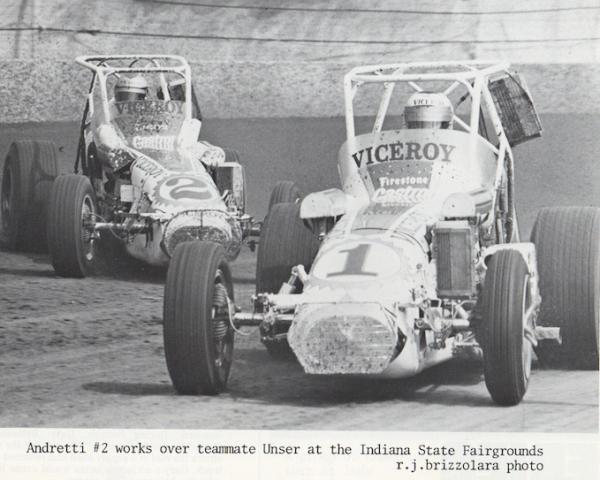
He dominated in his first Indy win in 1970 by starting from the pole and leading all but 10 of the 200 laps. Unser beat runner-up Mark Donohue by 32 seconds that year.
Unser won three Indy car national championships over his career and 39 victories— sixth on the all-time list.
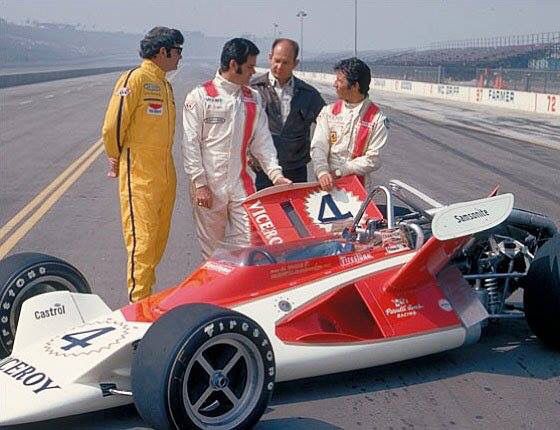
In 1978, Unser won the Indy car “Triple Crown” by winning all three of of the 500-mile races on the schedule, which included stops at Pocono Raceway and in Ontario, California. He’s the only driver in history to win all three of those races in the same season.
Unser was the 1978 IROC champion. He also competed in the 1968 Daytona 500 and four other NASCAR Winston Cup & Grand National races, all held on road courses with a best finish of fourth (twice).
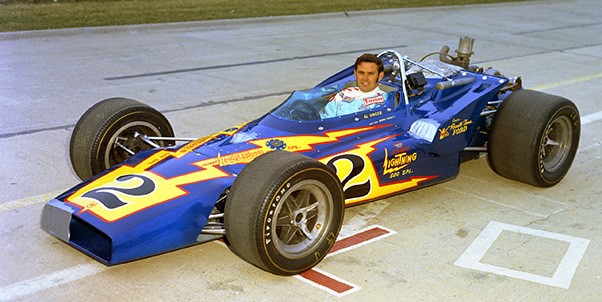
He began racing in 1957, at age 18, initially competing primarily in modified roadsters, sprint cars and midgets. In 1965 he raced in the Indianapolis 500 for the first time and finished ninth.
He won the Indy 500 in 1970, two years after his brother, Bobby. During the race, he led for all but ten of the 200 laps and averaged 155.749 miles per hour (250.654 km/h). His quick pit stops were a factor in the victory. That season he won a record ten times on oval, road and dirt tracks to capture the United States Auto Club national championship. Unser competed in USAC’s Stock Car division in 1967, and was the series Rookie of the Year.
In 1971 he won the Indy 500 again, starting from the fifth position with an average speed of 157.735 mph.
Unser’s bid to become the first three-time consecutive Indy 500 champion was thwarted when he finished second to Mark Donohue in the 1972 Indianapolis 500.
Despite starting the 1978 Indianapolis 500 from the fifth position in a First National City Travelers Checks Chaparral Lola, Unser’s car was considered before the race to be a second-tier entry at best, if not an outright long shot to win. Moving to the front of the field for the first time on lap 75, he and opponent Danny Ongais engaged in an on-again off-again duel for 75 more laps, before an engine failure on Ongais’ car on lap 150 allowed Unser to assume a commanding 35 second lead. Although suffering right front-wing misalignment due to impacting a tire on his final pit stop, a situation that led to the lead shrinking steadily over the race’s final 20 laps, it nevertheless proved wide enough for victory by nine seconds to spare at the checkered flag. Unser’s race average speed of 161.363 mph (259.689 km/h) ranked as the then-second fastest ever run (one mile per hour less than the then-1972 record), and would not itself be topped for second for four more years.
In the 1983 season, Unser joined Team Penske and drove for four years in a Penske-owned car. Unser controlled the late stages of the 1983 Indianapolis 500, leading 61 laps. With less than 20 laps to go, Unser got challenges from Tom Sneva who led the most laps. With help from his son – who was several laps down – Unser began pulling away from Sneva. However Sneva got by Al Jr., and set sail for Unser Sr.. Sneva caught up to Unser within one lap of passing Al Jr., and passed him to retake the lead with nine laps to go. Sneva then easily pulled away to win the race by 11 seconds, avenging his firing from the team in 1978. After the race, Unser Jr. was penalized two laps for his actions as well as having passed two cars under caution on lap 170.
Unser won the IndyCar championships in 1983 and 1985 by winning one race and then having several top-five finishes. In 1986, Penske decided to focus the team’s attention on teammate Rick Mears when he healed from serious injuries. As a result, Unser cut down his schedule to only a few IndyCar races a year, which he would do going forward.
